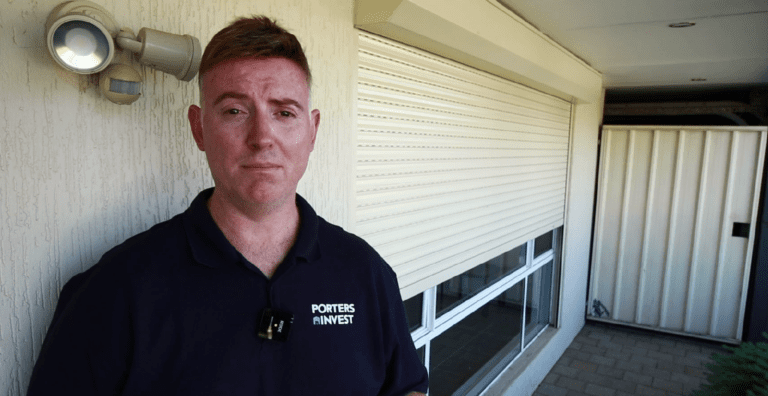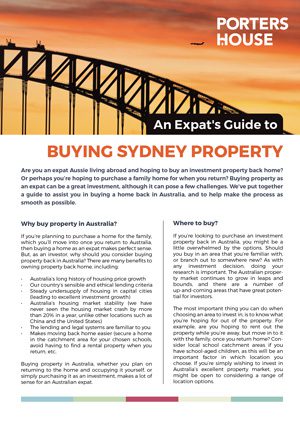There are many reasons for foreign investors to buy property in Australia. Our country is a great holiday and lifestyle destination, which attracts many foreigners for a sea-change. Furthermore, our stable political and banking climates, as well as low unemployment and steady inflation rates make Australia an attractive investment location.
Foreign investors face a number of restrictions and regulations when it comes to purchasing property in Australia, and if you’re not an Australian resident, knowing what rules apply to you can be a little confusing. Here, we break down the key points to foreign investment in Australia.
FIRB (Foreign Investment and Review Board) approval
The Foreign Investment Review Board (FIRB) was established in 1976 to advise Australia’s government and the treasurer on foreign investment policy and how it is administered. Although its powers are advisory only, Australian legislation requires that foreign investors apply for foreign investment approval from the FIRB before they are able to purchase residential property within Australia. This policy aligns with the Australian Government’s ambition to channel investment into new dwellings, thus increasing the number of new properties being built, generating jobs in construction, and making it easier for Australian residents to enter the property market.
As a result of these policies and aims, decisions and approvals on foreign investment are made depending on whether the property investment will result in an increase in Australia’s housing stock. Receiving approval from the FIRB usually takes around 30 days.
Rules – Dwelling types
The type of dwelling that foreign investors wish to purchase will have a bearing on whether approval will be granted by the FIRB.
New dwellings: A new dwelling is a residential property which has not been sold before, and has either not been previously occupied, or has not been occupied for more than 12 months if it was sold by a developer as a part of a development. New dwellings are generally approved for foreign investment without conditions. For the purposes of Australia’s foreign investment framework, new dwellings do not include existing properties which have been remodelled or renovated, or properties built in the place of demolished existing properties.
Redevelopment: Approval for the purchase of residential redevelopment property will generally be granted to foreign persons if the redevelopment is likely to result in an increase in Australia’s housing stock. This does not include the demolition of one property to create only a single new dwelling. Approval for the purchase of a redevelopment is general subject to conditions that:
- The existing dwelling is not occupied prior to demolition and redevelopment
- The demolition of the existing property and construction on the new dwelling are completed within four years of approval
- Within 30 days of completion of the new dwelling, the applicant must submit evidence of its completion
Vacant land: Vacant land is subject to the same restrictions as the purchase of property for redevelopment, by the FIRB. The land must be developed within 4 years of approval, and evidence of completion must be submitted by the investor within 30 days of the completion of development. Vacant land approval does not include the demolition of an existing property to build a new dwelling.
Established dwellings: In keeping with the policy to allow foreign investment only for the purposes of increasing Australia’s housing stock, established dwellings are generally not able to be purchased by foreign persons. Exceptions are made for temporary residents, who may purchase a property as their primary residence, however, no part of the property may be rented out or used for investment purposes.
Exemptions: A number of exemptions apply to FIRB approval guidelines. These include persons who hold an Australian or New Zealand passport or are permanent residents of Australian or New Zealand, or have an Australian or New Zealand citizen/permanent resident as a spouse and intend to purchase the property jointly with their spouse. Further exemptions apply to certain types of developments and properties acquired by will, for example. You can read the full list of exemptions here.
Lending and finance restrictions/requirements
Finding a loan from an Australian bank or lending institution can be tricky for foreign investors, as banks are aware of the higher risk and complexity involved with lending to foreign persons. That is not to say that it’s impossible, however. Some banks, such as Citibank, offer ‘overseas borrower’ loans, specifically tailored to foreign investors wishing to purchase property in Australia. The application process will include the following steps:
- Obtaining a FIRB concession (approval)
- Having at least 20% deposit available (depending on the financial institution’s requirements)
- Showing evidence of your income with electronic payslips or a letter from your employer
- Completing a formal declaration of your income
- If self-employed, providing evidence of income with an account declaration from your accountant
- Providing bank statements for at least three consecutive months
- Passing a credit check
- Ensuring that your country of residence is listed as an ‘acceptable domicile’
Speak to your mortgage broker to ensure that you’re prepared with the necessary information before applying for your loan. Your mortgage broker will also help you to choose the loan that’s right for you.
Additional stamp duty, land tax and other fees
Applying for approval to purchase property within Australia is subject to application fees. These are dependent on the price of the property acquisition. For an investment of up to AUD $1 million, the fee is $5,500. A full list of fees and thresholds can be found on the FIRB website.
Foreign investors are also subject to a 8% surcharge on stamp duty in NSW, which means that the total stamp duty payable is now 8%. Furthermore, foreign investors are no longer entitled to the 12-month deferral for payment of stamp duty on off-the-plan properties. The stamp duty surcharge varies in other states, and is 3% in QLD, for example (totalling 8.75% payable stamp duty). To calculate the stamp duty applicable to your investment purchase, you can use this stamp duty calculator.
As of 2018, a 2% surcharge also applies to land tax for foreign investors. You can read more about the land tax and stamp duty surcharges in NSW here.
Finally, a penalty of $5,000 was proposed in the 2017 Federal Budget for foreign investors who fail to occupy or lease their property for at least 6 months of the year, also known as the “ghost tax”. This is worth keeping in mind when considering purchasing an investment property within Australia.
Selling withholdings (capital gains tax)
Until recently, tax on the capital gains made from the disposal of a person’s main residence was subject to a capital gains tax exemption. This exemption no longer applies to foreign investors’ main residences, as announced on May 9th, 2017. This means that the sale of your main residence within Australia, as a foreign investor, will now incur capital gains tax (CGT). You can read more about this announcement and its implications here.
Enlist a buyer’s agent
If you’re thinking of investing in Australian property, enlisting the services of an experienced buyer’s agent like Porters House can save you a lot of time and hassle. Equipped with local knowledge, a buyer’s agent can help you make the best decision when it comes to buying an investment property. To avoid making common property-buying mistakes, talk to a buyer’s agent today.



